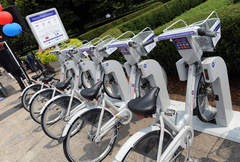
Chicago would have 3,000 bicycles to rent from 300 stations by next summer — with no charge for the first 30 minutes — under an ambitious plan in the works aimed at making cycling a “new transit system.”
Former Mayor Richard M. Daley’s dream of creating a Paris-style bike rental program in Chicago is about to take off, with the city issuing a “request for proposals” (RFP) for a grand plan bigger than Daley envisioned.
Mayor Rahm Emanuel and his handpicked Transportation Commissioner Gabe Klein are looking for an operator to offer 3,000 bikes at 300 stations by next summer and 5,000 bikes at 500 stations by 2014.
Currently, bike sharing in Chicago is a small private venture limited to 100 bikes at six stations at popular tourist destinations including the Museum Campus, Buckingham Fountain, the John Hancock Center, McCormick Place and Navy Pier.
The new program would be geared more toward everyday Chicagoans interested in making short trips by renting a bike at one location and dropping it off at another. Bike kiosks would likely be located at CTA and commuter rail stations and no more than a half-mile apart.
The city expects to use federal grants to purchase the bikes and build stations, then turn the network over to a private operator. The RFP calls for the first 30 minutes to be free, with a “graduated fee scale” for longer trips and $75 annual memberships for discounted use.
The city expects the system to be “self-sustaining” through revenues generated by memberships, user fees and sponsorships. A separate RFP will be issued to companies interested in advertising on bikes and stations or in sponsoring the entire program.
Car-sharing services such as I-Go offer the first 30 minutes free to encourage people to try the service in the belief that, if they do, they’ll become regular users. That’s the same philosophy the city is applying to bike sharing.
“We view this as a new transit system that’s self-powered. The idea is to have so many stations, it’s easy to get from one point to another quickly. It fills in the gap in the existing transit system and allows people to pick up a bike at one location and drop it off at their destination,” Klein said.
Klein predicted that Chicago’s bike-sharing program would be “overwhelmingly popular.” He noted that the plan he started in Washington D.C. doubled expectations in its first year and “started throwing off a profit.”
“It’ll become the best way for many people to get to work or make the last-quarter mile or one-mile connection to work,” he said.
Ron Burke, executive director of the Active Transportation Alliance, predicted that bike sharing would “create new transportation options” for people who live and work in Chicago and “help the city function more efficiently.”
Noting that cycling has doubled over the last decade, he said, “A lot of other people would bicycle if they had an option like bike sharing. I live in Oak Park. I can take Metra or the Green Line to work. Some days, it would be easier for me to take Metra, but the Ogilivie [Transportation] Center is a mile from my office. I would love to be able to get off a Metra train, hop on a bike and ride it over to my office.”
Ald. Marge Laurino (39th), chairman of the City Council’s Committee on Pedestrian and Traffic Safety, predicted that bike-sharing would be a smashing success.
“It sounds exciting. Bicycling is becoming a popular mode of transportation these days. Young people like to do it,” she said.
In 2007, Daley returned from a trip to Paris determined to duplicate a bike rental program credited with doubling cycling in Paris, only to hit a series of bureaucratic speed bumps.
A request for proposals from bike rental operators attracted only two companies, and neither of them met the city’s mandate to operate a program “at low cost or no cost” to taxpayers.
Last summer, a private company finally got the go-ahead to launch a pilot program at six pick-up and nine-drop off locations.
The pilot ended on Nov. 1 and resumed March 31. The city’s bike-sharing program is expected to be year-round.
From Chicago Sun Times
